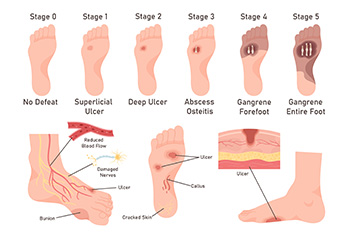
Managing Diabetic Foot Ulcers
Tuesday, 17 September 2024 00:00
A diabetic foot ulcer is a common complication of diabetes, characterized by open sores or wounds that develop on the feet, often due to poor circulation and neuropathy. These ulcers can result from minor injuries or pressure points and can be slow to heal, posing a risk of infection. Finding relief involves several steps. Firstly, controlling blood sugar levels is essential to promote healing. Regularly inspecting and cleaning the ulcer with mild soap and water helps prevent infection. Using appropriate wound dressings and ensuring the affected foot is kept dry and protected is also important. Offloading pressure through custom orthotic devices or specialized footwear can aid in healing. Seeking prompt medical attention from a podiatrist for advanced treatments, such as debridement or antibiotics, ensures effective management and reduces the risk of complications. If you have diabetes or have developed a foot ulcer, it is suggested that you are under the care of a podiatrist who can effectively treat foot wounds.
Wound care is an important part in dealing with diabetes. If you have diabetes and a foot wound or would like more information about wound care for diabetics, consult with Dr. Randy Garr from Bigfoot Podiatry. Our doctor will assess your condition and provide you with quality foot and ankle treatment.
What Is Wound Care?
Wound care is the practice of taking proper care of a wound. This can range from the smallest to the largest of wounds. While everyone can benefit from proper wound care, it is much more important for diabetics. Diabetics often suffer from poor blood circulation which causes wounds to heal much slower than they would in a non-diabetic.
What Is the Importance of Wound Care?
While it may not seem apparent with small ulcers on the foot, for diabetics, any size ulcer can become infected. Diabetics often also suffer from neuropathy, or nerve loss. This means they might not even feel when they have an ulcer on their foot. If the wound becomes severely infected, amputation may be necessary. Therefore, it is of the upmost importance to properly care for any and all foot wounds.
How to Care for Wounds
The best way to care for foot wounds is to prevent them. For diabetics, this means daily inspections of the feet for any signs of abnormalities or ulcers. It is also recommended to see a podiatrist several times a year for a foot inspection. If you do have an ulcer, run the wound under water to clear dirt from the wound; then apply antibiotic ointment to the wound and cover with a bandage. Bandages should be changed daily and keeping pressure off the wound is smart. It is advised to see a podiatrist, who can keep an eye on it.
If you have any questions, please feel free to contact our office located in Provo, UT . We offer the newest diagnostic and treatment technologies for all your foot care needs.





